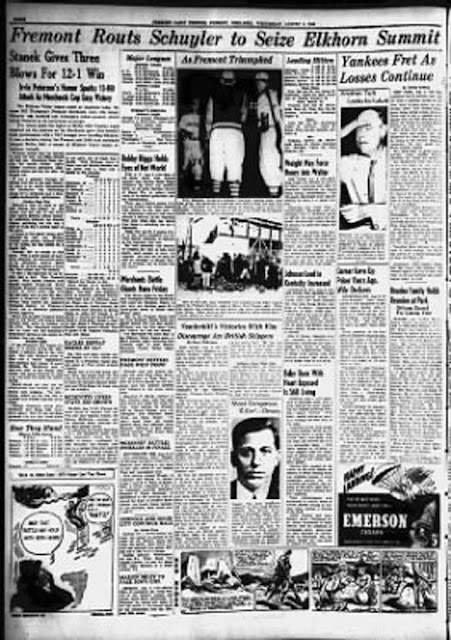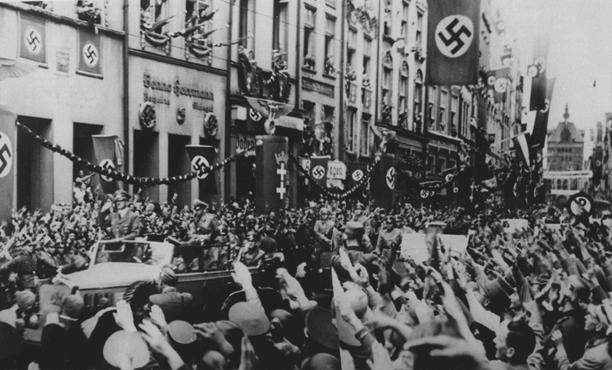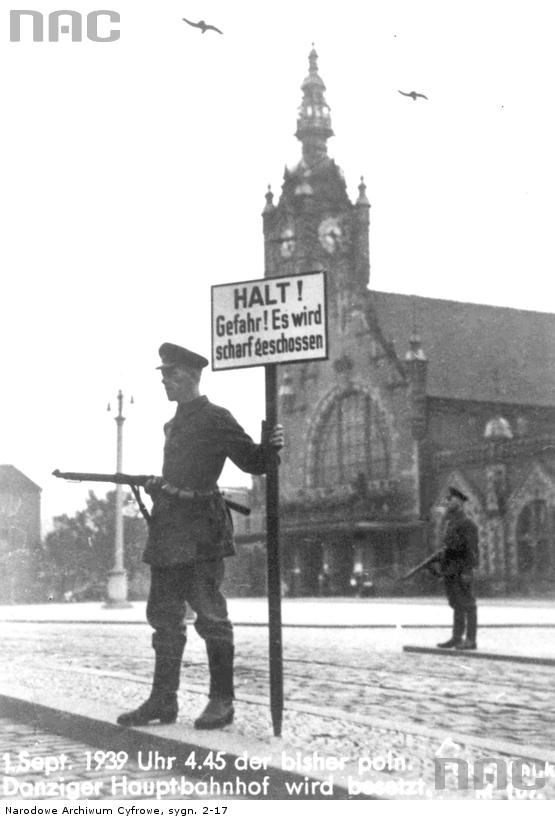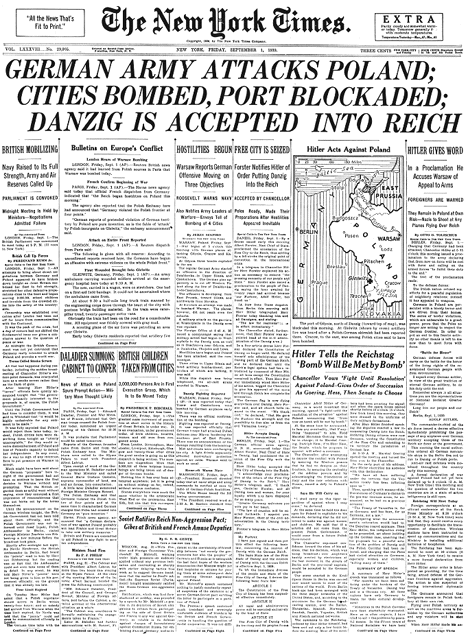Wednesday 9 August 1939
 |
| As its nose art, this RAF bomber quotes Hermann Goering as saying "No enemy bomber will operate over the Reich territory" (Life). |
German Government: On 9 August 1939, Hermann Goering (Göring), the head of the Luftwaffe, makes a prediction:
The promise, of course, is quickly broken. Some Allied bomber crews even paint the phrase or a variation of it on the noses of their aircraft as a sort of impudent rebuke. By 1945, Berlin's air raid sirens become known to the city's residents as "Meier's trumpets," or "Meier's hunting horns." However, Goering himself remains popular with the people even during the last days of the Battle of Berlin.
At Berchtesgaden, Adolf Hitler holds a conference on the Danzig (Gdansk) situation with Albert Foster, the NSDAP Gauleiter for the city. The plan is for Foster to stage "agitations" for a German annexation of the city and prepare the way for the entry of German troops, many of whom will be arriving before the outbreak of hostilities in plain clothes. Hitler has a full slate of meetings scheduled for this week during which he announces his fateful plans for the outbreak of World War II.
Italian Government: The Mussolini government imposes fines on anyone moving from rural areas to cities with populations over 25,000 inhabitants. The intent is to keep people safe from possible bombing raids upon the cities. The Italian government is actively encouraging citizens to move out of citizens, and this new law is intended to further these internal migration patterns.
British Government: George VI conducts a fleet review of 133 ships at Weymouth Bay. Throughout the war, King George remains very close to military affairs.
US Government: Among a flurry of bills being finalized before its recess, Congress passes 31 USC 401. It authorizes the confiscation and forfeiture of vehicles, vessels, and aircraft being used to transport certain illegal items. This act is amended in 1950 to include a vast array of drug-related contraband among the items making a vehicle etc. subject to forfeiture.
American Homefront: In her nationally syndicated "My Day" column, Eleanor Roosevelt ponders the beginning of a long recess for Congress:
New York Yankees third baseman Red Rolfe begins an 18-game run-scoring streak that will never (as of this writing) be broken and only tied once in 2000. Rolfe's 139 runs scored in 1939 leads the league.
Future History: Claude Wilson Osteen is born in Caney Spring, Tennessee. He becomes a Major League Baseball pitcher from 1957 - 1975 and a three-time All-Star.
2020
The Ruhr will not be subjected to a single bomb. If an enemy bomber reaches the Ruhr, my name is not Hermann Göring: you can call me Meyer!The phrase "I want to be called Meyer if …." is a typical German idiom meant to imply that the thing mentioned is impossible. While some view Goering's use of the word Meyer (or Meier) as being an insult to Jews, that does not appear to have been the intent. In fact, Meyer (spelled in different ways) is the second most common surname in Germany.
The promise, of course, is quickly broken. Some Allied bomber crews even paint the phrase or a variation of it on the noses of their aircraft as a sort of impudent rebuke. By 1945, Berlin's air raid sirens become known to the city's residents as "Meier's trumpets," or "Meier's hunting horns." However, Goering himself remains popular with the people even during the last days of the Battle of Berlin.
At Berchtesgaden, Adolf Hitler holds a conference on the Danzig (Gdansk) situation with Albert Foster, the NSDAP Gauleiter for the city. The plan is for Foster to stage "agitations" for a German annexation of the city and prepare the way for the entry of German troops, many of whom will be arriving before the outbreak of hostilities in plain clothes. Hitler has a full slate of meetings scheduled for this week during which he announces his fateful plans for the outbreak of World War II.
 |
| Silent film actress Phyllis Gordon (1889 – 1964) window-shopping in Earls Court, London, on August 9, 1939. She is accompanied by her four-year-old cheetah, flown to Britain from Kenya. |
British Government: George VI conducts a fleet review of 133 ships at Weymouth Bay. Throughout the war, King George remains very close to military affairs.
US Government: Among a flurry of bills being finalized before its recess, Congress passes 31 USC 401. It authorizes the confiscation and forfeiture of vehicles, vessels, and aircraft being used to transport certain illegal items. This act is amended in 1950 to include a vast array of drug-related contraband among the items making a vehicle etc. subject to forfeiture.
 |
| The Fremont, Nebraska, Fremont Tribune for 9 August 1939 notes that 'Yankees Fret As Losses Continue," but today is the start of something big for them and one of their players. |
As I look over the last few weeks, I begin to think that some of the press is correct in thinking that the Republican minority with 20 to 25 percent of the minority Democrats are going to stand out primarily for their sporting disposition. These two minorities, which constitute a majority, have made two bets with the public. One is that there will be no war in Europe until they return in January. If they lose, it might be rather serious, for little influence could be brought to bear by the Executive to try to avert war.Of course, nobody overseas is looking to Washington to have any influence on a coming European war. However, Roosevelt's comments always give some insight into how the highest echelons of the U.S. government are viewing world affairs, and the threat of war clearly is on her mind.
New York Yankees third baseman Red Rolfe begins an 18-game run-scoring streak that will never (as of this writing) be broken and only tied once in 2000. Rolfe's 139 runs scored in 1939 leads the league.
Future History: Claude Wilson Osteen is born in Caney Spring, Tennessee. He becomes a Major League Baseball pitcher from 1957 - 1975 and a three-time All-Star.
 |
| The Golden Gate International Exposition, a World's Fair held on Treasure Island in the San Francisco Bay, declares 9 August 1939 "Matson Day" after the shipping company. |
2020






